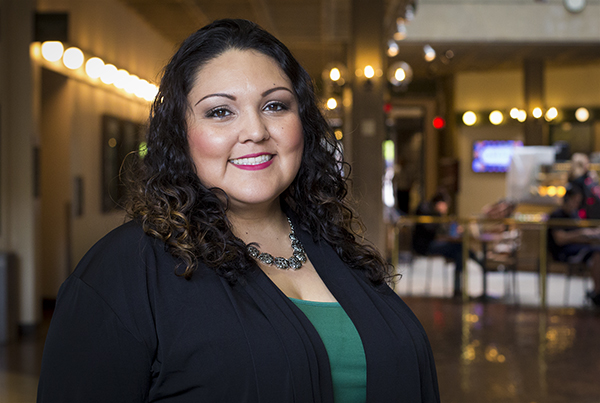 Danielle Muñoz, Sacramento State's new case manager. (Sacramento State/Jessica Vernone)
Danielle Muñoz, Sacramento State's new case manager. (Sacramento State/Jessica Vernone)Sacramento State students who face serious obstacles to their studies have a strong advocate in Danielle Muñoz, a new case manager at the University.
“Some students are coming in with complex issues that aren’t one-time emergencies,” says Muñoz, who works out of the Division of Student Affairs. “There is a lot of homelessness – students living in their car or on a friend’s couch – and if they’re far from home and their living situation isn’t working out, moving back in with their parents isn’t an option, because that would take them away from Sacramento.
"Those students are on my radar, to help them get through school and out of homelessness.”
An estimated 8.7 percent of students in the California State University (CSU) system are "displaced" in terms of their housing, and 21 percent are identified as “food-insecure,” according to a recent canvass of administrators, faculty, and staff at the 23 campuses.
However, a survey of CSU students themselves revealed more troubling figures: 12 percent say they’re homeless, and 24 percent admit to not having enough money for food.
Muñoz connects displaced students with community agencies to help them find housing. She refers students with food insecurities to the campus food pantry operated by Associated Students Inc. and helps them apply for the Student Emergency Fund, which provides immediate monetary assistance.
Since Spring 2016 got underway in January, Muñoz has helped more than 40 students. Some were referrals from faculty or staff concerned about possible suicidal thoughts or because a student acted out in an alarming manner. In those cases, Muñoz encourages the students to seek help through Student Health and Counseling Services at The WELL, the campus recreation and wellness facility.
She follows up with students to be sure they go for help.
“I enjoy working in case management and am especially grateful to provide it at Sacramento State, because I have the opportunity to help students move forward with their goals and graduation dreams,” Muñoz says. “There is so much on the line. I say to them, ‘You want to graduate. I want you to graduate. So let’s figure out how we can get through the challenges.’ ”
Muñoz, whose father was in the Marine Corps and often moved his family around the country, grew up mostly in Texas and Southern California. She earned a bachelor’s degree in sociology from UC Davis and a master of science from Sacramento State in counseling education: marriage and family therapy. Before returning to Sac State as the University's case manager, she worked for the community program Turning Point, Dignity Health, and the Alta Regional Center.
“We’re lucky to have Danielle, because she has a solid case management background in the community, and that’s enormous value added,” says Beth Lesen, associate vice president for Student Engagement and Support. “There are resources in the Sacramento area that our students need to be able to avail themselves of, along with the resources on campus.”
In addition to her role as case manager, Muñoz coordinates Sacramento State’s multidisciplinary Crisis Intervention Team, which meets biweekly and as needed to identify and discuss students who may be at risk of endangering themselves or others.
After a student killed 32 people and wounded 17 on the Virginia Tech campus in 2007, the Central Intelligence Agency recommended that all colleges and universities establish a behavior threat-assessment unit on campus. Sac State’s Crisis Intervention Team dates to 1996, more than a decade before the Virginia Tech incident.
In addition to Muñoz and Lesen, the team’s members are:
- Chief Mark Iwasa, Sacramento State Police Department
- Ron Lutz, clinical director of Student Health and Counseling Services
- Scott Oleinik, Human Resources benefits manager
- Jill Peterson, University Counsel
- Tom Carroll, Student Organizations and Leadership; and Samuel Jones, Housing and Residential Life, who are serving on the team until a new student conduct officer is hired.
“Any safety concerns on campus are brought to the team,” Muñoz says. “Most issues can be dealt with through case management appointments – meeting students’ needs and getting them to resources.
“Sometimes just the idea that someone on campus supports them is such a relief. Half of their stress is feeling that they’re alone and isolated. After I meet with students and we have a plan, some of their anxiety goes away.”
Muñoz can be reached from 8 a.m. to 5 p.m. Monday through Friday by calling (916) 278-6060 or (916) 278-7511, or dropping by Lassen Hall 3008. – Dixie Reid
